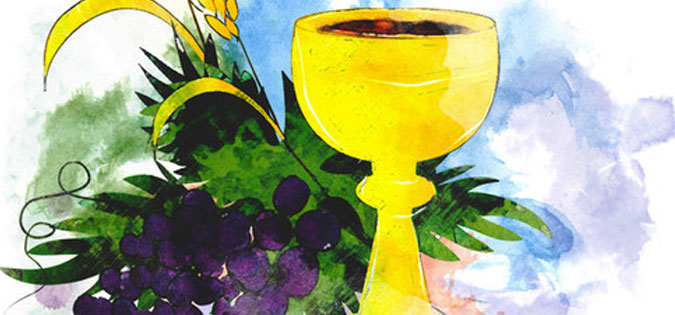 In the Anima Christi prayer, we pray, “Blood of Christ, inebriate me.” I ask to be made drunk with God’s love. Can I really drink this cup? What does the cup mean to me? To answer these questions, I visit in my imagination with the mother of Zebedee’s children (Matthew 27:55–56). She tells me:
In the Anima Christi prayer, we pray, “Blood of Christ, inebriate me.” I ask to be made drunk with God’s love. Can I really drink this cup? What does the cup mean to me? To answer these questions, I visit in my imagination with the mother of Zebedee’s children (Matthew 27:55–56). She tells me:
What mother would wish crucifixion for her sons? While my sons were hidden, I dared climb the hill with many other women. We risked revilement, mistreatment, and worse. But we also felt invisible. Who would bother a knot of horrified women?
I stood at a distance with the cluster of women on Calvary. I couldn’t bear to be any closer to watching Jesus’ final breaths. As I thought about my request some time ago—that James and John be on Christ’s right and left (Matthew 20:20–28)—I felt ashamed. The words of Christ echoed in my head: “You don’t know what you’re asking.” He was right. I wanted only the upside of discipleship. Give me miracles and happy endings. My sons’ enthusiastic, “Yes!” and, “We are able!” seemed shallow as I watched Jesus approach death.
Looking at those men being tortured made me shudder. I wished in that moment to be with Zebedee, still catching fish at Lake Genneseret, providing for the extended family.
My stomach growled, but my hunger was mitigated by watching how much Jesus suffered. Even at that distance, I could feel him seeing me there. I sensed he was grateful for my motionless accompaniment.
The blood horrified and mesmerized. His wet, red forehead, his scraped knees, and his strafed torso added to the distortion of his body. The horror of the scene was burned in my memory. After his death, when they lanced his side, I remembered God’s covenant with our ancestors, sealed with blood.
I leaned on some of the other women for support.
It is now years after that day on Golgotha, and I approach the chalice every week as a member of a community of believers. Before that cup goes to my lips, I take a deep breath. I’m agreeing to something big, something powerful. This is not a casual sip.
This calls me to love, a love that hurts. It’s a mother watching her son die when she can do nothing to alleviate his pain. It’s a man abandoned by his friends, longing to feel their encouragement when he is close to the end of his rope.
Bread feeds when the loaf is broken apart, but blood flows together, pulling separate droplets into one. Liquids blend easily; we cannot separate one morsel from another. To drink this cup is an affirmation of the coagulation of community. Through the common cup we share as a living memorial of the Last Supper, we fuse into one body, even though we each have a different mission.
I hope and pray that I can drink this cup worthily, endure suffering, and say yes to a difficult call to follow Christ. In retrospect, I see that I was privileged to stand as a witness to Jesus’ death.
Will I really walk the talk when I leave here? I cannot mechanically sip and smile. I’m saying yes to the tough road of following Christ crucified.

How many of us truly understand God’s unconditional love for us? Thanks Loretta for drawing me into a deeper understanding.
Full of impact and thought provoking. Thanks for the reflection.
Rizpah’s love for her unjustly slain sons (2 Samuel 21.10), mirrors Mary’s empathy towards the suffering of Mother Mary, the universal empathy of all mothers for their sons. Mother Mary believed in the Triumphal Resurrection and expiation of our sins through the Holy Blood of Jesus.
Dear Loretta Thank you a very beautiful reflection as I sit in our chapel of Herman
Cohen at our Carmelite Priory in London
God bless John Williamson odc
John, my heart joins you, through the Sacred Heart, sitting reverently before God’s great love. Thank you for taking a moment to write.
Wow – a powerful image. Thank you.
What a lovely and touching reflection!! This made me think about approaching the altar during communion, my unworthiness to receive Him in body and blood. Jesus’ unending mercy and forgiveness is always present. Every drop of Jesus counts and He saved me. Thanks for sharing!!